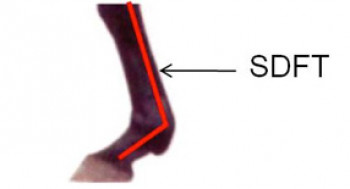Project
Role of the inter-fascicular matrix in age related deterioration of tendon mechanical function
| Primary Investigator: | Chavaunne Thorpe |
| Co-investigators: | Hazel Screen |
| Peter Clegg | |
| Helen Birch | |
| Graham Riley | |
| Funder: | BBSRC Funded: BB/K008412 /1 |
Tendon injury is very common, and the risk of injury increases with age. Some tendons, such as the human Achilles and equine superficial digital flexor tendon (SDFT) are more likely to be injured than others. This is partly due to their function; while most tendons are involved in limb placement, some, including the Achilles and SDFT, also act as energy stores and so need to be able to extend and recoil efficiently.
We have evidence that the large extensions required in energy storing tendons are facilitated by sliding between fascicular subunits. Therefore the inter-fascicular matrix (IFM), which binds the fascicles together, is likely to play an important role in energy storing tendon, and variations in the IFM may affect the ability of tendons to extend and recoil.
The aim of this project is therefore to quantify IFM structure and function and relate this to tendon fatigue and failure properties, to test the hypothesis that energy storing tendons have a specialised IFM, enabling them to sustain large repetitive strains without damage. Further, we will assess age-related changes in these parameters, hypothesizing that age-related deterioration of the IFM reduces its extensibility and elasticity, predisposing aged tendons to injury.
In support of our hypotheses, we have demonstrated that high fatigue resistance of the tendon interfascicular matrix (IFM) is important for tendon function, particularly in tendons that act as energy stores. This capacity for fatigue resistance is likely provided by 2 proteins, lubricin and elastin, which we have shown are highly localised to the IFM.
We have further demonstrated that proteins within the IFM are renewed more rapidly than those in the fascicles, and additionally have shown that cyclic over loading of tendon explants causes damage predominantly within the IFM. Taken together, these data indicate that damage in response to overload may localise to the tendon IFM, potentially giving the IFM a protective role, in which it prevents damage propagation throughout the tendon by limiting it to an area which can more easily repair.
We have also answered important questions regarding the effect of ageing on tendon structure function relationships, demonstrating that, while the fatigue resistance of both fascicles and the IFM decreases with ageing, the IFM suffers greater age-related changes overall. The age-related reductions in IFM elasticity and fatigue resistance are accompanied by a reduction in the rate of protein renewal, and decreased elastin content and organisation. This likely results in a reduced ability to repair damage to this region and therefore contributes to the increased risk of injury with ageing. These findings open up new avenues to explore how age-related alterations in IFM may affect tendon response to loading and subsequent injury susceptibility.
A greater understanding of how tendon responds to loading, how damage occurs, and how this is altered with ageing, will be of interest to medical and veterinary clinicians as these findings will help guide the development of treatments and preventative measures for tendon injury. Our findings will also be of benefit to researchers with an interest in soft tissue structure-function relationships. Further, our findings are also of importance to tissue engineering and biomaterials focussed academics, as improved understanding of tissue function is key to developing appropriate artificial repairs.
Publications arising from this project:
- Thorpe CT, Riley GP, Birch HL, Clegg PD, Screen HRC (2017) Fascicles and the interfascicular matrix show decreased fatigue life with ageing in energy storing tendons. Acta Biomater, (Accepted)
- Thorpe CT, Riley GP, Birch HL, Clegg PD, Screen HRC (2016) Fascicles and the interfascicular matrix show adaptation for fatigue resistance in energy storing tendons. Acta Biomater. 15;42:308-15.
- Thorpe CT, Karunaseelan KJ, Chieng Hin JN, Riley GP, Birch HL, Clegg PD, Screen HRC (2016) Distribution of proteins within different compartments of tendon varies according to tendon type. J Anat. 229;3: 450-458.
- Thorpe CT, Peffers MJ, Simpson D, Halliwell E, Screen HRC, Clegg PD (2016) Anatomical heterogeneity of tendon: Fascicular and interfascicular tendon compartments have distinct proteomic composition. Scientific Reports. doi: 10.1038/srep20455
- Thorpe C.T., Godinho M.S.C., Riley G.P., Birch H.L., Clegg P.D., Screen H.R.C. (2015) The interfascicular matrix enables fascicle sliding and recovery in tendon, and behaves more elastically in energy storing tendons. JMBBM 52: 85-94
- Thorpe C.T., Chaudhry S., Lei I.I., Varone A., Riley G.P., Birch H.J., Clegg P.D., Screen H.R.C. (2014) Tendon overload results in alterations in cell shape and increased markers of inflammation and matrix degradation. SJMSS 25:4: e381-91.
- Thorpe C.T., Spiesz E. M., Chaudhry S., Screen H.R.C., Clegg P.D. (2014) Science in Brief: Recent Advances into Understanding Tendon Function and Injury Risk. Equine Vet J. 47; 2: 137-40.
- Peffers M.J., Thorpe C.T., Collins J.A., Eong R, Wei T.K., Screen H.R.C., Clegg P.D. (2014) Proteomic analysis reveals age-related changes in tendon matrix composition, with age-and injury-specific matrix fragmentation. J Biol Chem. 289:37; 25867-78
- Thorpe C.T., Riley G.P., Birch H.L., Clegg P.D., Screen H.R.C. (2014) Effect of fatigue loading on structure and functional behaviour of fascicles from energy-storing tendons. Acta Biomaterialia 10:7; 3217-3224
- Thorpe C.T., Riley G.P., Birch H.L., Clegg P.D., Screen H.R.C. (2014) Fascicles from energy-storing tendons show an age-specific response to cyclic fatigue loading. J Roy Soc Int 11:92; 20131058



